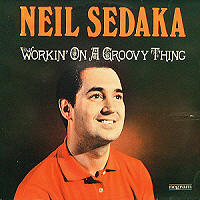The topic of this article may not meet Wikipedia's general notability guideline .(July 2025) |
| Workin' on a Groovy Thing | ||||
|---|---|---|---|---|
 | ||||
| Studio album by | ||||
| Released | 1969 | |||
| Recorded | Festival Records Sydney, Australia | |||
| Genre | Pop | |||
| Length | 39:55 | |||
| Label | Festival, MCA | |||
| Producer | Neil Sedaka, Pat Aulton | |||
| Neil Sedaka chronology | ||||
| ||||
| Alternate cover | ||||
 | ||||
Workin' on a Groovy Thing is a 1969 studio album by the American pop singer Neil Sedaka. Recorded while Sedaka was touring Australia that year, it was a one-off recording for the Sydney-based label Festival Records; by that time his career had slumped, and his contract had not been renewed by his former label in the USA, RCA Victor. It was recorded in Festival's studios in Sydney, and was co-produced by Sedaka and Festival house producer Pat Aulton, with John Farrar taking care of the musical arrangements. The LP featured notable Australian session players of the period, including guitarist Jimmy Doyle (later a member of jazz-rock band Ayers Rock) and veteran jazz musician John Sangster.
Contents
In the United Kingdom, the album was released on the MCA label under the title Sounds of Sedaka.